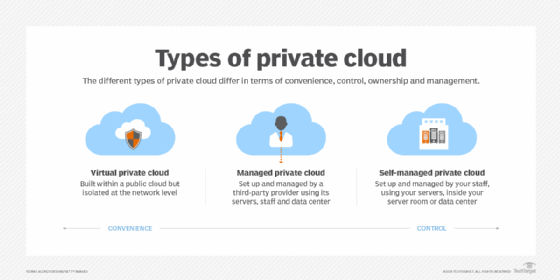
Getty Images/iStockphoto
Compare the 3 types of private cloud
The different types of private cloud offer varying levels of control, customization and convenience. These factors affect the benefits, challenges and use cases for each model.
All private clouds provide the same core benefits, including greater control over cloud infrastructure and workloads. These advantages can make them attractive in industries where control and visibility are priorities, such as healthcare and finance.
That said, private clouds come in many forms. The most traditional model is one that a business sets up and manages itself, inside its own data center. But enterprises have other approaches to create and operate private clouds, each with its advantages and drawbacks.
To provide guidance on which type of private cloud model is best, this article discusses the three kinds and their specific use cases:
- Self-managed private clouds.
- Managed private clouds.
- Virtual private clouds (VPCs).
Self-managed private cloud
A self-managed private cloud, sometimes referred to as an on-premises private cloud, is one that an organization creates and manages itself.
Under this type of model, a business's own employees acquire, set up and manage the software platform on which the private cloud is based, such as OpenStack. The infrastructure that powers this type of private cloud exists in a facility that the business owns or rents. This facility could be an on-premises server room, a data center owned by the company or a colocation center where it rents rack space.
The main advantage of a self-managed private cloud is it provides the maximum possible control over cloud configuration, data and workloads. No element of the platform's deployment or operation is outsourced, so the business has total control.
Use cases
A self-managed private cloud is best for use cases where organizations prioritize maximum transparency, as well as risk control and mitigation. For example, a self-managed private cloud is beneficial for a company following compliance regulations to ensure that the personnel who manage its IT infrastructure reside in or are citizens of a certain country. This model enables the business to determine which staff can access the cloud environment.

Managed private cloud
A managed private cloud is a private cloud that is used by one organization and managed by another.
For example, if a company hires an MSP to set up and operate a custom private cloud environment, it creates a managed private cloud.
This type of cloud model is similar in many respects to the public cloud, where providers also offer managed cloud infrastructure and services to customers. However, the crucial difference between a public cloud and a managed private cloud is that a managed private cloud reserves the entire cloud environment for the use of one organization. If the managed cloud operator serves multiple customers, it has strict isolation boundaries within its cloud infrastructure to segment servers and workloads between different customers.
The main advantage of a managed private cloud is it enables businesses to outsource the work of cloud setup and management to a third-party provider. This model reduces the burden placed on the company's own IT staff. In addition, managed private cloud providers have deep expertise in managing private environments, so they might offer better cloud performance, cost management and security optimizations than businesses could achieve in-house.
But managed private clouds reduce the amount of control and transparency a business has over its cloud environment. While this model enables more customizability and visibility than an organization typically gets from the public cloud, the managed provider restricts how the private cloud is set up and operated based on what it is willing to do.
Use cases
A managed private cloud is a good option for organizations that lack the in-house IT resources necessary to operate a self-managed private cloud but require more control than they'd get from the public cloud. Managed private clouds might also benefit companies that don't want to manage their own server infrastructure but can't move their workloads into a public cloud, due to challenges such as having to host legacy applications that aren't compatible with public cloud services.
Virtual private cloud
A VPC is a cloud environment that exists within a public cloud platform but is isolated at the network level from other parts of that platform.
A VPC gives businesses extensive control over how workloads within their VPC environment interface with external workloads or services based on network traffic restrictions. This control over network connections and workload exposure is what makes VPCs a type of private cloud.
In other aspects, however, VPCs mostly resemble public clouds. A public cloud provider owns the underlying infrastructure, not the business using the VPC. Further, the isolation between the VPC environment and other parts of the public cloud platform is defined only in software. In most cases, VPCs don't provide customers with dedicated cloud servers used only by them, although some VPC offers based on dedicated servers are available.
The services and management tools available in a VPC are the same as those supported by the broader public cloud platform on which the VPC is based. A customer that sets up a VPC on AWS, for instance, uses AWS cloud services to provision and manage its workloads.
VPCs don't match the control and privacy delivered by a traditional, self-managed private cloud, but they are more convenient to set up and manage. Unlike managed private clouds, VPCs on most major public cloud computing platforms don't require users to pay additional fees to a cloud provider. To use a VPC, customers pay only for the cloud infrastructure or servers that operate within their VPC. In some cases, additional VPC features, such as those designed to provide extra security controls, are available at an added cost.
Use cases
VPCs make sense for businesses that don't require deep control over their workloads or infrastructure and are, therefore, willing to use the public cloud. VPCs still give an additional layer of privacy and security beyond what customers get in a default public cloud environment.
Chris Tozzi is a freelance writer, research adviser, and professor of IT and society who has previously worked as a journalist and Linux systems administrator.








